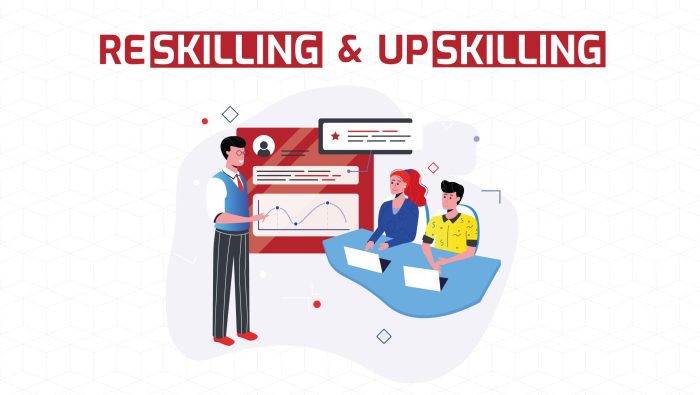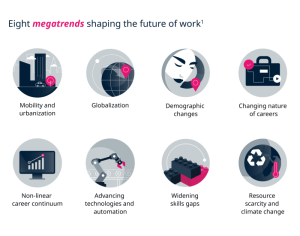
Step into the world of upskilling and reskilling courses where opportunities for growth and success abound. Get ready for an exciting journey filled with learning and development!
In today’s fast-paced job market, the need to continuously upgrade skills is more crucial than ever. Whether you’re looking to climb the career ladder or switch paths, these courses offer a pathway to new possibilities.
Upskilling and Reskilling Courses Overview

Upskilling and reskilling are both essential in today’s rapidly changing job market, but they serve slightly different purposes. Upskilling involves learning new skills to enhance your existing capabilities within your current field, while reskilling involves learning entirely new skills to switch to a different career path.
Difference Between Upskilling and Reskilling
Upskilling is commonly seen in industries such as technology, healthcare, and marketing, where professionals need to stay updated with the latest trends and technologies to remain competitive. On the other hand, reskilling is often required in industries facing disruption, such as retail, manufacturing, and transportation, where workers need to transition to new roles to adapt to changing demands.
Industries in High Demand for Upskilling and Reskilling Courses
- Technology: With constant advancements in technology, professionals in IT, cybersecurity, and data science need to upskill to stay relevant.
- Healthcare: The healthcare industry is evolving rapidly, requiring continuous learning for roles such as telemedicine, health informatics, and medical coding.
- Digital Marketing: As digital marketing strategies evolve, professionals need to upskill in areas like , social media marketing, and content creation.
Importance of Continuous Learning in Today’s Job Market
In today’s fast-evolving job market, continuous learning is crucial for staying competitive and adapting to changes. Employers are increasingly seeking candidates who show a willingness to learn and grow, making upskilling and reskilling essential for career advancement and job security.
Benefits of Upskilling and Reskilling Courses
Upskilling and reskilling courses offer numerous benefits to individuals looking to enhance their career prospects and earning potential.
Enhanced Career Prospects
Taking upskilling courses can help individuals acquire new skills and knowledge that are in demand in the job market. By staying updated with the latest industry trends and technologies, individuals can make themselves more attractive to potential employers and increase their chances of landing a job or advancing in their current role.
Real-Life Success Stories
There are countless success stories of individuals who have benefited from reskilling programs. For example, John, a marketing professional, took up a digital marketing course and was able to transition into a more lucrative role in a tech company. By acquiring new skills, he not only increased his job satisfaction but also significantly boosted his earning potential.
Increased Job Satisfaction and Higher Earning Potential
Upskilling can lead to increased job satisfaction as individuals feel more confident and competent in their roles. Additionally, acquiring new skills can open up opportunities for career advancement and higher-paying positions. Employers often value employees who are proactive in their professional development and are willing to invest in their growth.
Popular Upskilling and Reskilling Courses

In today’s rapidly evolving job market, upskilling and reskilling have become essential for staying competitive and relevant. Let’s explore some of the popular courses in technology, healthcare, business, and other sectors that are in high demand.
Technology Courses
In the technology sector, courses such as data science, artificial intelligence, cybersecurity, and full-stack web development are highly sought after. These courses are typically structured as online programs to accommodate learners from anywhere in the world. The duration of these courses can vary from a few weeks to several months, depending on the depth of the content. The costs associated with technology upskilling and reskilling programs can range from a few hundred dollars to several thousand, depending on the provider and the level of expertise being offered.
Healthcare Courses
In the healthcare sector, courses like medical coding, healthcare administration, nursing informatics, and telemedicine are gaining popularity. These courses are often offered in a hybrid format, combining online lectures with in-person practical training. The duration of healthcare upskilling and reskilling programs can range from a few months to a year or more, with costs varying based on the institution and the specific specialization being pursued.
Business Courses
For those interested in business, courses in project management, digital marketing, financial analysis, and strategic leadership are in high demand. Business courses are typically delivered online, allowing for flexibility in learning. The duration of business upskilling and reskilling programs can range from a few weeks to several months, with costs varying depending on the institution and the level of certification offered.
Educational Platforms for Upskilling and Reskilling
When looking to upskill or reskill, choosing the right educational platform is crucial to your learning journey. There are various online platforms available that offer a wide range of courses to help you enhance your skills and knowledge.
Coursera
Coursera is a popular online learning platform that partners with universities and organizations to offer a variety of courses, specializations, and even degrees. Some key features of Coursera include:
- High-quality courses from top institutions
- Flexible learning options with self-paced courses
- Opportunities to earn certificates and even degrees
- Engaging content with video lectures, quizzes, and assignments
Udemy
Udemy is known for its vast library of courses on a wide range of topics, including technical skills, soft skills, and more. Here are some key features of Udemy:
- Wide selection of courses taught by industry experts
- One-time purchase for lifetime access to course materials
- Opportunities to interact with instructors and other students
- Regularly updated content to stay relevant
LinkedIn Learning
LinkedIn Learning, formerly known as Lynda.com, is a platform that offers courses to help professionals improve their skills and advance their careers. Some key features of LinkedIn Learning include:
- Personalized course recommendations based on your profile and interests
- Access to courses taught by industry professionals
- Integration with LinkedIn for easy sharing of certificates
- Mobile app for learning on the go
Choosing the right platform depends on your individual learning needs, preferences, and goals. Consider factors such as course content, instructor quality, user reviews, certification options, and pricing when selecting the platform that best fits your requirements. Happy learning!
Importance of Education and Training in Upskilling
Formal education plays a crucial role in complementing upskilling efforts by providing a strong foundation of knowledge and skills that can be further enhanced through specialized training. Let’s explore how education and training work hand in hand to boost career opportunities.
Role of Certifications and Degrees in Career Advancement
Certifications and degrees serve as valuable credentials that showcase a certain level of expertise and competence in a particular field. They not only validate one’s knowledge but also open doors to new career prospects and advancement opportunities. Employers often look for candidates with relevant certifications and degrees, as they demonstrate a commitment to continuous learning and professional development.
- Certifications: Obtaining industry-recognized certifications can help professionals stand out in a competitive job market. These certifications validate specialized skills and knowledge, making individuals more marketable to potential employers.
- Degrees: A formal degree, whether it’s a bachelor’s, master’s, or doctoral degree, provides a comprehensive education in a specific discipline. It not only equips individuals with in-depth knowledge but also enhances critical thinking, problem-solving, and analytical skills.
By combining certifications and degrees, professionals can create a well-rounded profile that demonstrates both theoretical knowledge and practical expertise, increasing their overall employability.
Boosting Employability with a Combination of Education and Training
The combination of formal education and specialized training offers a holistic approach to upskilling, enhancing both theoretical understanding and hands-on practical experience. This dual approach not only broadens one’s skill set but also increases adaptability and versatility in the ever-evolving job market.
- Formal Education: Academic programs provide a strong foundation of knowledge, principles, and theories that form the basis of a particular field. They offer a structured learning environment that encourages critical thinking, research skills, and academic rigor.
- Specialized Training: Hands-on training, workshops, and certifications focus on practical skills and real-world applications within a specific industry or job role. They enable individuals to acquire relevant, up-to-date skills that are directly applicable to their professional endeavors.
By combining formal education with specialized training, individuals can develop a comprehensive skill set that not only meets the demands of their current role but also prepares them for future career advancements and opportunities.
Final Thoughts
Don’t miss out on the chance to advance your career and unlock new opportunities. Embrace the power of upskilling and reskilling courses today to stay ahead in the ever-changing job landscape.
Detailed FAQs
What is the difference between upskilling and reskilling?
Upskilling involves enhancing existing skills, while reskilling is about learning new skills for a different job or industry.
Where are upskilling and reskilling courses in high demand?
Industries like technology, healthcare, and business are seeing a surge in the need for upskilling and reskilling courses.
How can upskilling courses enhance career prospects?
By acquiring new skills and knowledge, individuals can make themselves more valuable to employers, leading to better career opportunities.
Are upskilling courses only available online?
No, upskilling courses can be offered online, in-person, or through hybrid formats to cater to different learning preferences.





